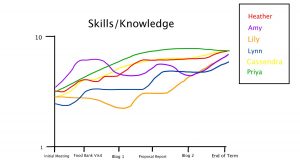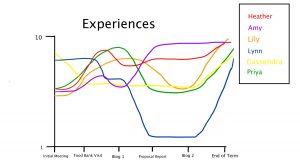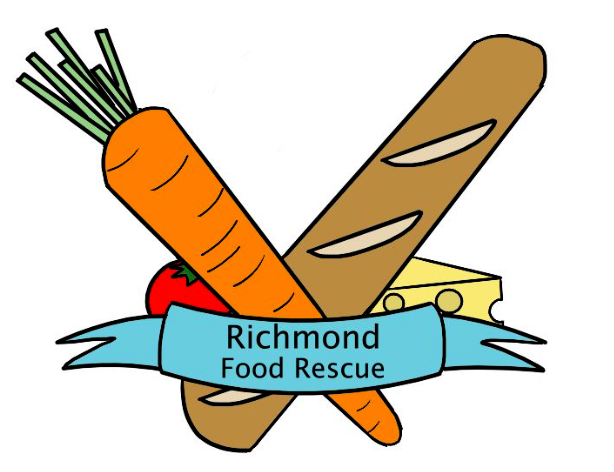Introduction:
In the past week, we continued to make sufficient progress on our community project. We were able to gather data from Richmond grocery stores about their food waste. In the upcoming weeks, we aim to finish our infographic and brochure, as well as prepare for the final presentation on March 26.
During our Moment of Significance Change workshop, we were able to reflect on our experiences and the knowledge we gained throughout the term. Additionally, we were able to rethink our group dynamic to try to improve our ability to work together and complete our project to the best of our abilities.
Weekly Objectives and Future Objectives:
March 4-10 (Current):
- Contact the managers from Superstore, Walmart, and Shoppers Drug Mart and have the survey filled out with the answers for the five questions created from the previous blog (Blog 2).
- Submit the logo for the brochure to our community partners for their approval and start drafting the content of the brochure for the Richmond Food Bank.
- Present findings from the managers from each of the three grocery stores mentioned in Objective 1 in a graph showcasing the amount of food they donate and the amount of food the Richmond Food Bank receives.
March 11-17:
- Finish drafting the content of the brochure for the Richmond Food Bank and send to our community partners for review and feedback.
- If necessary, make changes to the brochure based on any feedback provided by our community partners.
- Send the revised brochure back to community partners for any further feedback and have a final copy made within the same week if possible.
- Start discussing about the content to be put in our infographic.
March 18-24:
- Start the infographic and present it to community partners for possible changes to be made. If not, the infographic will then be edited and submitted to both the course and Hajira for final viewing.
- Finish the final copy of the brochure if the final copy is not finished during the previous week.
- Start on the final report of the project to conclude our findings and results and propose possible future projects or studies to be conducted.
- Work on final presentation for the public presentation in the Nest in April and practice said presentation.
Future Objectives:
- Prepare for our final presentation in the Nest and practice the presentation the week prior to the public presentation.
- Have presentation ready for practice at least a week prior to the public presentation which will be taking place on March 26 (presentation should be ready by March 19).
- Organize and analyze the information we have gathered during the progression of the project and start drafting our final report.
- Have group members choose sections of the report to work on so we can start writing and gathering references needed to support our sections.
- Have Final Report be finished for review and editing by the group members by April 6.
- Contact Hajira to see if the Food Bank Committee likes the brochure design, content, and effectiveness on raising public awareness and increasing the amount of perishable food item donations from the currently participating and new grocery stores.
Achievements:
- Collected answers for the survey from the managers at Walmart, Superstore, and Shoppers Drug Mart.
- Summarized the results for the survey
- Completed the graph for the information provided by the Richmond Food Bank on the amount of perishable food items and non-perishable food items they received from each of the participating grocery stores by weight.
- Started the discussion on the content of the brochure.
- Started to draft the brochure to be sent to community partners for viewing and feedback so we can revise the brochure the following week.
Moment of Significance Change Workshop:
Skills and Knowledge:

Generally as a group, when we started this community project, our skill and knowledge levels were in the middle on a scale of one to ten. This means that we knew some things about what we were going to be learning throughout the term but still had lots of room for learning new things and acquiring new skills. Some of the concepts we were familiar with were food security, food justice, and food sovereignty, which we learned about in LFS 250.
Throughout our experiences with the project thus far, our skill and knowledge levels gradually increased. We learned more about current and local food system issues from in-class lectures and tutorials, and gained insight about the current food insecurity problems in a local community during our visit to the Richmond Food Bank. More importantly, we put the learnings from class into practice. For instance, we put comments on ideas we were unsure or confused about to separate people from problems and always exchanged ideas with our community partners to make sure both parties are satisfied. Our skill levels also increased significantly when we wrote our proposal report because for most of us, it was our first time writing something like this.
There were a few moments when our skill and knowledge levels decreased as we didn’t know as much as we thought we did after certain events.
By the end of term, we hope to further improve our knowledge on the various issues within food systems so we are able to apply this information to future courses or careers. Furthermore, we hope to enhance our proposal writing, communication, team collaboration, critical thinking, and problem solving skills.
Experiences:

After our initial meeting at the start of the term, our experience or emotional levels varied from moderate to above moderate. Some of us were unsure of what to expect from the course and from the community project while the rest of the group had an optimistic and hopeful outlook on what was to come.
After our visit to the Food Bank, our emotions improved for the majority of the group. It was a positive experience as we were able to better comprehend how a food bank functions and how essential it is to many people within the community.
There were some moments throughout the term when our experience levels decreased. A number of factors contributed to this. For example, communication issues within the group led to members feeling frustrated. In Tim Harford’s Ted Talk, he discussed how working in situations that makes one feel uncomfortable can be positive because it encourages creative thinking (Harford, 2017). This can relate to our group in the sense that working with people whom we have not met prior to the start of the term can cause uneasiness and improve our creative thinking. For some of us, the proposal report resulted in a decrease in experiences. The concept of writing a proposal was unfamiliar to us and was therefore difficult to complete.
By the end of the term and the end of the project, we hope for all of our experiences to improve.
Moment of Significance:
During the current week of March 4 to March 10, we have made significant progress on our project. From the Session 8 Moment of Significant Change Workshop, we had promised that we will be more active in terms of communication between group members so we can get things done as soon as possible well before the due date. So far, in the beginning of this current week; we have been exchanging progress each of us had made when we said to contact the managers from the three grocery stores (Superstore, Walmart, and Shoppers Drug Mart) so that we can have our survey completed. Despite the difficulties posed by the possibility that some stores may not answer our call or questions, we still strive to achieve our set objectives to the best of our abilities.
Graceful Dismount:
Team Support and Time Management:
In order to ensure that our group is consistently working on completing the weekly objectives and not falling behind, we have assigned tasks to each group member and have set deadlines ahead of the assignment due date such that this allows time for editing. Our communication has improved as we keep each other updated of one another’s progress on a daily basis and bring up any issues as soon as they occur. As such problems arise, everyone makes their own suggestions for solutions and then we collectively decide on the resolution. We have come to realize and work around everyone’s differences as we focus on each other’s strengths and learn to be more open and accepting of each other’s ideas. As we have come to know each other throughout our work together on this project, we have become more comfortable with vocalizing our opinions and feelings and will ask for help from other group members when needed.
Active Communication with Community Partners:
We found that active communication with our community partners has helped a great deal in conflict resolution and problem-solving. The issue at hand is overwhelming and our tasks were vague, however, we have learned that effective community partnerships have missions, values, goals, and outcomes that are agreed upon by both parties (University of Memphis, 2018). After analyzing the feedback and suggestions from our community partners, we have a clearer idea about the Richmond Food Banks’ needs and expectations. For example, our original plan was to survey both farm markets and grocery stores within the Richmond area. After reviewing the Food Donor Encouragement Act that was provided by our community partners, we decided to focus on retail stores that the Richmond Food Bank is not currently receiving any perishable food items from including Superstore, Walmart, and Shoppers Drug Mart such that we can increase the number of donors instead of trying to increase perishable food donations from current donors. To achieve further reciprocal relationships between the university and the community as stated by University of Memphis (2018), we will keep our community partners updated about our group’s progress, while asking for more insight or help when needed to ensure that we are including all necessary and accurate information in future assignments.
Conclusion:
As we approach the last couple weeks of the semester, we can finally see the light at the end of the tunnel. Most of the challenging parts of the project are behind us and we can finally breathe a little before the next big push which includes our final report and presentation. A few weeks ago, as our schedules got busier with other deadlines, we were all feeling lost as we had little communication in regards to the project and weren’t sure how we were going to work around each others’ differences. Each group member has recognized that their contribution to this project is vital in order for it to be successful and we have learned to promote each other’s strengths instead of putting blame on our weaknesses. As a group, we feel much more positive about our progression thus far and will continue to support each other and everyone’s interests going forward.
References:
(Video) Harford, T. (2016, January 17). How messy problems can inspire creativity. Retrieved March 10, 2018, from https://www.youtube.com/watch?v=Jd_j_kw_jZQ
The University of Memphis. (2018). Engaged Scholarship. Retrieved March 10, 2018 from http://www.memphis.edu/ess/module3/
